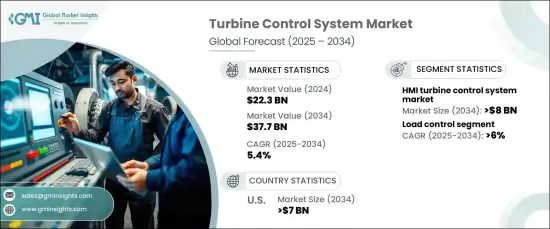
|
시장보고서
상품코드
1667080
터빈 제어 시스템 시장 : 기회, 성장 촉진요인, 산업 동향 분석, 예측(2025-2034년)Turbine Control System Market Opportunity, Growth Drivers, Industry Trend Analysis, and Forecast 2025 - 2034 |
||||||
세계의 터빈 제어 시스템 시장은 2024년에 223억 달러로 평가되었으며, 2025년부터 2034년에 걸쳐 5.4%의 연평균 복합 성장률(CAGR)로 견조하게 성장할 것으로 예측됩니다.
해상풍력발전소에 대한 투자 증가와 기존 에너지원의 고갈에 대한 우려의 고조에 추진된 재생가능에너지에 대한 주목의 고조가 이 성장을 뒷받침하고 있습니다. 또한 지속 가능한 에너지 생산을 목표로 한 대규모 인프라 투자는 첨단 터빈 제어 시스템에 대한 수요를 더욱 밀어 올리고 있습니다.

휴먼 머신 인터페이스(HMI) 분야는 2034년까지 80억 달러라는 경이적인 성장을 이룰 전망입니다. 이러한 현저한 성장은 최첨단 데이터 분석 및 시각화 도구의 보급으로 인한 것입니다. 터치스크린 인터페이스, 제스처 인식, 증강현실 및 가상현실(AR/VR) 기술의 통합을 특징으로 하는 최신 HMI 솔루션은 운영에 혁명을 가져오고 있습니다. 또한 원격 모니터링 기능, 데이터 로깅 강화, AI 및 머신러닝(ML) 기술의 도입이 역동적이고 유망한 비즈니스 환경을 만들어 냅니다.
| 시장 범위 | |
|---|---|
| 시작 연도 | 2024 |
| 예측 연도 | 2025-2034년 |
| 시작 금액 | 223억 달러 |
| 예측 금액 | 377억 달러 |
| CAGR | 5.4% |
부하 제어 시스템 시장 부문은 2034년까지 연평균 복합 성장률(CAGR) 6%라는 경이적인 성장률로 확대될 것으로 예측됩니다. 이 성장의 원동력은 실시간 데이터와 고급 예측 알고리즘에 대한 의존도 증가입니다. 센서 기술, 통신 시스템, AI를 활용한 제어 알고리즘의 혁신으로 효율성과 신뢰성이 크게 향상되었습니다. 또한, 엄격한 그리드 통합 기준과 정밀한 부하 관리의 임박한 필요성은 에너지 부문 전반에 걸쳐 고급 부하 제어 시스템의 채택을 가속화하고 있습니다.
미국의 터빈 제어 시스템 시장은 2034년까지 70억 달러의 평가 금액에 도달할 것으로 예상됩니다. 이 나라에서는 지원 정책 및 규제 프레임워크에 의해 지원되는 신재생에너지로의 전환이 진행되고 있으며, 이는 주요 촉진요인이 되고 있습니다. 전력 장비 및 구성 요소의 현지 제조를 위한 노력이 국내 수요에 맞는 솔루션 기회를 창출하고 있습니다. 또한 운송 및 제조와 같은 중요한 부문의 전기는 지속가능성에 대한 강한 헌신과 함께 터빈 제어 시스템의 채택을 전국적으로 확대하고 있습니다.
목차
제1장 조사 방법과 조사 범위
- 시장 범위와 정의
- 시장 추계·예측 파라미터
- 예측 계산
- 데이터 소스
- 1차 데이터
- 2차 데이터
- 유료
- 공적
제2장 주요 요약
제3장 업계 인사이트
- 생태계 분석
- 규제 상황
- 업계에 미치는 영향요인
- 성장 촉진요인
- 업계의 잠재적 위험 및 과제
- 성장 가능성 분석
- Porter's Five Forces 분석
- 공급기업의 협상력
- 구매자의 협상력
- 신규 참가업체의 위협
- 대체품의 위협
- PESTEL 분석
제4장 경쟁 구도
- 서론
- 전략적 전망
- 혁신과 지속가능성의 전망
제5장 시장 규모와 예측 : 구성 요소별(2021-2034년)
- 주요 동향
- 소프트웨어
- 컨트롤러
- 센서
- HMI
- 기타
제6장 시장 규모와 예측 : 제품별(2021-2034년)
- 주요 동향
- 증기 터빈 제어 시스템
- 가스 터빈 제어 시스템
- 수력 터빈 제어 시스템
- 풍력 터빈 제어 시스템
- 기타
제7장 시장 규모와 예측 : 기능별(2021-2034년)
- 주요 동향
- 속도 제어
- 온도 제어
- 부하 제어
- 압력 제어
- 기타
제8장 시장 규모와 예측 : 지역별(2021-2034년)
- 주요 동향
- 북미
- 미국
- 캐나다
- 멕시코
- 유럽
- 영국
- 프랑스
- 독일
- 러시아
- 스페인
- 이탈리아
- 아시아태평양
- 중국
- 일본
- 한국
- 인도
- 호주
- 인도네시아
- 말레이시아
- 태국
- 중동 및 아프리카
- 사우디아라비아
- 아랍에미리트(UAE)
- 이란
- 이집트
- 남아프리카
- 나이지리아
- 터키
- 모로코
- 라틴아메리카
- 브라질
- 아르헨티나
- 칠레
제9장 기업 프로파일
- ABB
- AEG Power Solutions
- ANDRITZ
- B&R
- Bachmann
- DEIF A/S
- EATON
- Emerson Electric Co.
- General Electric
- GTC Control Solutions, Inc.
- Heinzmann GmbH &Co. KG.
- Hitachi
- HollySys Group Beijing
- Honeywell International Inc.
- Ingeteam
- Innoway Future Solutions
- Mitsubishi Heavy Industries, Ltd.
- Petrotech.
- Rockwell Automation, Inc.
- Schneider Electric
- Siemens Energy
- SKF
- Sulzer Ltd.
- Valmet
- Vestas
- Voith GmbH &Co. KGaA
- Woodward
- Yokogawa Electric Corporation
The Global Turbine Control System Market, valued at USD 22.3 billion in 2024, is projected to grow at a robust CAGR of 5.4% from 2025 to 2034. The surging focus on renewable energy, fueled by increased investments in offshore wind farms and rising concerns about the depletion of conventional energy sources, is driving this growth. Additionally, significant infrastructure investments aimed at sustainable energy production are further propelling the demand for advanced turbine control systems.

The Human-Machine Interface (HMI) segment is poised to generate an impressive USD 8 billion by 2034. This remarkable growth stems from the widespread adoption of cutting-edge data analytics and visualization tools. Modern HMI solutions, featuring touch-screen interfaces, gesture recognition, and the integration of augmented and virtual reality (AR/VR) technologies, are revolutionizing operations. Furthermore, remote monitoring capabilities, enhanced data logging, and the implementation of AI and machine learning (ML) technologies are creating a dynamic and promising business landscape.
| Market Scope | |
|---|---|
| Start Year | 2024 |
| Forecast Year | 2025-2034 |
| Start Value | $22.3 Billion |
| Forecast Value | $37.7 Billion |
| CAGR | 5.4% |
The load control system market segment is projected to expand at an impressive 6% CAGR through 2034. This growth is driven by the increasing reliance on real-time data and advanced forecasting algorithms. Innovations in sensor technology, communication systems, and AI-powered control algorithms are significantly improving efficiency and reliability. Moreover, stringent grid integration standards and the pressing need for precise load management are accelerating the adoption of sophisticated load control systems across the energy sector.
The U.S. turbine control system market is expected to reach a valuation of USD 7 billion by 2034. The country's ongoing shift toward renewable energy, backed by supportive policies and regulatory frameworks, is a key growth driver. Efforts to localize the manufacturing of power equipment and components are creating opportunities for tailored solutions that meet domestic demands. Additionally, the electrification of critical sectors like transportation and manufacturing, coupled with a strong commitment to sustainability, is amplifying the adoption of turbine control systems nationwide.
Table of Contents
Chapter 1 Methodology & Scope
- 1.1 Market scope & definitions
- 1.2 Market estimates & forecast parameters
- 1.3 Forecast calculation
- 1.4 Data sources
- 1.4.1 Primary
- 1.4.2 Secondary
- 1.4.2.1 Paid
- 1.4.2.2 Public
Chapter 2 Executive Summary
- 2.1 Industry synopsis, 2021 - 2034
Chapter 3 Industry Insights
- 3.1 Industry ecosystem analysis
- 3.2 Regulatory landscape
- 3.3 Industry impact forces
- 3.3.1 Growth drivers
- 3.3.2 Industry pitfalls & challenges
- 3.4 Growth potential analysis
- 3.5 Porter's analysis
- 3.5.1 Bargaining power of suppliers
- 3.5.2 Bargaining power of buyers
- 3.5.3 Threat of new entrants
- 3.5.4 Threat of substitutes
- 3.6 PESTEL analysis
Chapter 4 Competitive Landscape, 2024
- 4.1 Introduction
- 4.2 Strategic outlook
- 4.3 Innovation & sustainability landscape
Chapter 5 Market Size and Forecast, By Component, 2021 – 2034 (USD Million)
- 5.1 Key trends
- 5.2 Software
- 5.3 Controller
- 5.4 Sensors
- 5.5 HMI
- 5.6 Others
Chapter 6 Market Size and Forecast, By Product, 2021 – 2034 (USD Million)
- 6.1 Key trends
- 6.2 Steam turbine control system
- 6.3 Gas turbine control system
- 6.4 Hydro turbine control system
- 6.5 Wind turbine control system
- 6.6 Others
Chapter 7 Market Size and Forecast, By Function, 2021 – 2034 (USD Million)
- 7.1 Key trends
- 7.2 Speed control
- 7.3 Temperature control
- 7.4 Load control
- 7.5 Pressure control
- 7.6 Others
Chapter 8 Market Size and Forecast, By Region, 2021 – 2034 (USD Million)
- 8.1 Key trends
- 8.2 North America
- 8.2.1 U.S.
- 8.2.2 Canada
- 8.2.3 Mexico
- 8.3 Europe
- 8.3.1 UK
- 8.3.2 France
- 8.3.3 Germany
- 8.3.4 Russia
- 8.3.5 Spain
- 8.3.6 Italy
- 8.4 Asia Pacific
- 8.4.1 China
- 8.4.2 Japan
- 8.4.3 South Korea
- 8.4.4 India
- 8.4.5 Australia
- 8.4.6 Indonesia
- 8.4.7 Malaysia
- 8.4.8 Thailand
- 8.5 Middle East & Africa
- 8.5.1 Saudi Arabia
- 8.5.2 UAE
- 8.5.3 Iran
- 8.5.4 Egypt
- 8.5.5 South Africa
- 8.5.6 Nigeria
- 8.5.7 Turkey
- 8.5.8 Morocco
- 8.6 Latin America
- 8.6.1 Brazil
- 8.6.2 Argentina
- 8.6.3 Chile
Chapter 9 Company Profiles
- 9.1 ABB
- 9.2 AEG Power Solutions
- 9.3 ANDRITZ
- 9.4 B&R
- 9.5 Bachmann
- 9.6 DEIF A/S
- 9.7 EATON
- 9.8 Emerson Electric Co.
- 9.9 General Electric
- 9.10 GTC Control Solutions, Inc.
- 9.11 Heinzmann GmbH & Co. KG.
- 9.12 Hitachi
- 9.13 HollySys Group Beijing
- 9.14 Honeywell International Inc.
- 9.15 Ingeteam
- 9.16 Innoway Future Solutions
- 9.17 Mitsubishi Heavy Industries, Ltd.
- 9.18 Petrotech.
- 9.19 Rockwell Automation, Inc.
- 9.20 Schneider Electric
- 9.21 Siemens Energy
- 9.22 SKF
- 9.23 Sulzer Ltd.
- 9.24 Valmet
- 9.25 Vestas
- 9.26 Voith GmbH & Co. KGaA
- 9.27 Woodward
- 9.28 Yokogawa Electric Corporation


















